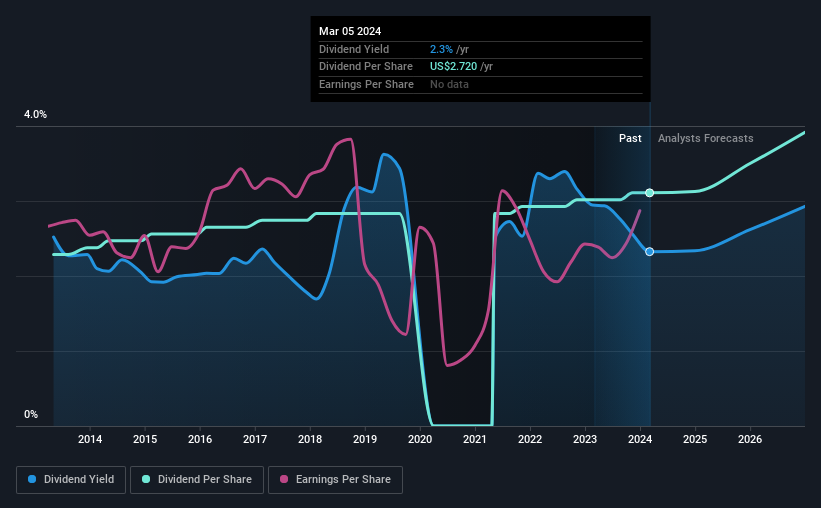Four Days Left Until Autoliv, Inc. (NYSE:ALV) Trades Ex-Dividend
Regular readers will know that we love our dividends at Simply Wall St, which is why it's exciting to see Autoliv, Inc. (NYSE:ALV) is about to trade ex-dividend in the next 4 days. The ex-dividend date occurs one day before the record date which is the day on which shareholders need to be on the company's books in order to receive a dividend. The ex-dividend date is an important date to be aware of as any purchase of the stock made on or after this date might mean a late settlement that doesn't show on the record date. In other words, investors can purchase Autoliv's shares before the 11th of March in order to be eligible for the dividend, which will be paid on the 27th of March.
The company's next dividend payment will be US$0.68 per share, and in the last 12 months, the company paid a total of US$2.72 per share. Looking at the last 12 months of distributions, Autoliv has a trailing yield of approximately 2.3% on its current stock price of US$117.00. We love seeing companies pay a dividend, but it's also important to be sure that laying the golden eggs isn't going to kill our golden goose! As a result, readers should always check whether Autoliv has been able to grow its dividends, or if the dividend might be cut.
View our latest analysis for Autoliv
Dividends are usually paid out of company profits, so if a company pays out more than it earned then its dividend is usually at greater risk of being cut. Autoliv paid out a comfortable 46% of its profit last year. A useful secondary check can be to evaluate whether Autoliv generated enough free cash flow to afford its dividend. Dividends consumed 55% of the company's free cash flow last year, which is within a normal range for most dividend-paying organisations.
It's positive to see that Autoliv's dividend is covered by both profits and cash flow, since this is generally a sign that the dividend is sustainable, and a lower payout ratio usually suggests a greater margin of safety before the dividend gets cut.
Click here to see the company's payout ratio, plus analyst estimates of its future dividends.
Have Earnings And Dividends Been Growing?
Stocks in companies that generate sustainable earnings growth often make the best dividend prospects, as it is easier to lift the dividend when earnings are rising. If earnings fall far enough, the company could be forced to cut its dividend. This is why it's a relief to see Autoliv earnings per share are up 6.5% per annum over the last five years. While earnings have been growing at a credible rate, the company is paying out a majority of its earnings to shareholders. If management lifts the payout ratio further, we'd take this as a tacit signal that the company's growth prospects are slowing.
Another key way to measure a company's dividend prospects is by measuring its historical rate of dividend growth. Since the start of our data, 10 years ago, Autoliv has lifted its dividend by approximately 3.1% a year on average. We're glad to see dividends rising alongside earnings over a number of years, which may be a sign the company intends to share the growth with shareholders.
To Sum It Up
Should investors buy Autoliv for the upcoming dividend? Earnings per share have been growing at a steady rate, and Autoliv paid out less than half its profits and more than half its free cash flow as dividends over the last year. It might be worth researching if the company is reinvesting in growth projects that could grow earnings and dividends in the future, but for now we're not all that optimistic on its dividend prospects.
In light of that, while Autoliv has an appealing dividend, it's worth knowing the risks involved with this stock. Every company has risks, and we've spotted 3 warning signs for Autoliv you should know about.
If you're in the market for strong dividend payers, we recommend checking our selection of top dividend stocks.
Have feedback on this article? Concerned about the content? Get in touch with us directly. Alternatively, email editorial-team (at) simplywallst.com.
This article by Simply Wall St is general in nature. We provide commentary based on historical data and analyst forecasts only using an unbiased methodology and our articles are not intended to be financial advice. It does not constitute a recommendation to buy or sell any stock, and does not take account of your objectives, or your financial situation. We aim to bring you long-term focused analysis driven by fundamental data. Note that our analysis may not factor in the latest price-sensitive company announcements or qualitative material. Simply Wall St has no position in any stocks mentioned.

